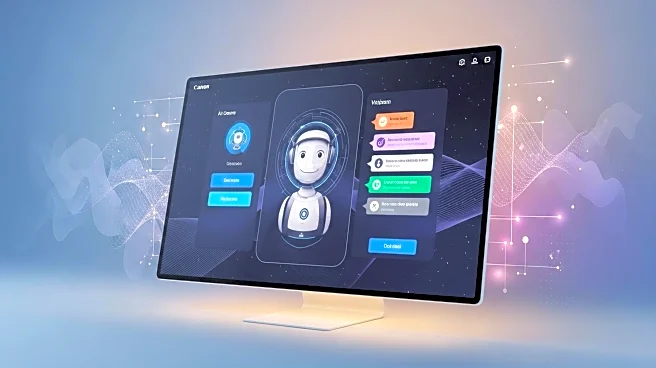What's Happening?
The AI startup 'Friend' has transitioned from its initial product, a wearable pendant, to a web-based chatbot interface. This pivot comes after the company's advertising campaign faced defacement in New York City's subway system. The pendant, priced at $129, was designed to be an always-listening device, but faced public rejection due to privacy concerns. The web-based interface allows users to engage with the chatbot for free, aiming to attract more users by reducing the friction associated with purchasing and wearing the pendant. Friend CEO Avi Schiffmann claims the pivot has attracted 200,000 users, though this figure includes anyone who has initiated a chat, regardless of continued engagement or conversion to pendant purchases.
Why It's Important?
The shift to a web-based interface reflects broader societal concerns about privacy and the acceptance of AI technologies. The initial rejection of the pendant highlights public resistance to always-on listening devices, echoing past controversies with similar technologies like Google Glass. This development underscores the challenges AI companies face in balancing innovation with consumer privacy expectations. The pivot may influence other tech companies to reconsider product designs that involve constant surveillance, potentially shaping future AI product strategies. Additionally, the company's marketing approach, focusing on large numbers and attention-grabbing tactics, may impact how tech startups strategize their public relations and advertising campaigns.
What's Next?
Friend's transition to a web-based platform may lead to increased scrutiny from privacy advocates and regulatory bodies concerned with data protection. The company may need to address these concerns to maintain user trust and expand its user base. As the AI industry evolves, other companies might follow suit, opting for less intrusive interfaces to engage users. The success of Friend's pivot could influence the development of AI-driven products, encouraging a shift towards more accessible and privacy-conscious solutions. Stakeholders, including investors and tech developers, will likely monitor the company's progress to gauge the viability of similar business models.
Beyond the Headlines
The ethical implications of AI technologies that simulate relationships are significant, raising questions about the impact on social interactions and mental health. The reliance on AI for companionship could alter societal norms around human connection, potentially leading to increased isolation or dependency on technology for emotional support. This development may prompt discussions on the ethical responsibilities of AI developers in creating products that affect human behavior and relationships. Long-term, the integration of AI in daily life could redefine cultural perceptions of friendship and communication.









